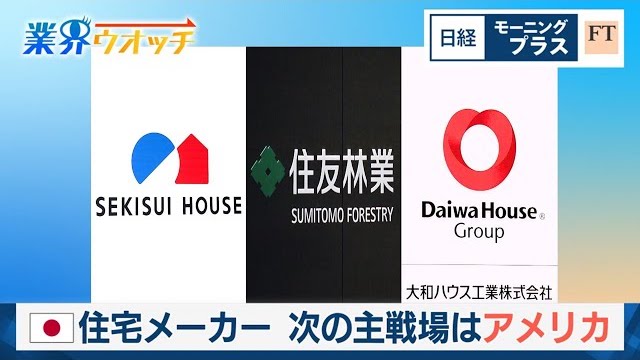TOKYO, Aug 14 (News On Japan) - Japan’s housing demand is on a declining trend due to population decrease and a reduction in the number of households. This is evident in the consistent decrease in new housing starts since the peak in the late 1990s. In this environment, the strategies of major companies can be broadly categorized into three areas: diversification within the housing business, diversification into non-housing businesses, and overseas expansion.

The 2023 fiscal year sales rankings of Japan’s major housing manufacturers place Daiwa House Industry, Sekisui House, and Sumitomo Forestry at the top. Daiwa House leads in non-housing business, such as logistics and commercial facilities, while Sekisui House has traditionally focused on the domestic housing market but is now actively expanding into hotels and overseas markets. Sumitomo Forestry, on the other hand, has experienced rapid growth in the U.S. housing market.
The major companies are increasingly strengthening their U.S. operations. In April, Sekisui House acquired the U.S. homebuilder MDC Holdings for approximately 750 billion yen. Daiwa and Sumitomo are also expanding their presence through mergers and acquisitions. The U.S. is an attractive market due to its population growth and the increasing number of households, particularly among Generation Z and Millennials, making it a structurally expanding market for housing.
Sekisui House has introduced its unique construction methods, developed in Japan, to the U.S., focusing on earthquake-resistant and smart home technologies. In contrast, Daiwa House and Sumitomo Forestry are leveraging the brands of the companies they have acquired, aiming for steady growth by selling homes tailored to the American market, which they see as a local industry.
In addition to housing, the companies are also investing in the hotel business. Sekisui House is collaborating with Marriott International to develop luxury hotels, such as St. Regis, and regional hotels adjacent to roadside stations in Japan. Daiwa is accelerating its investment in business hotels through its subsidiary, Daiwa Roynet Hotels. Meanwhile, Sumitomo Forestry entered the hotel business three years ago, participating in regional revitalization projects in collaboration with government and private sectors.
The expansion of hotel operations is largely driven by the inbound tourism boom, which is supporting the growth of the hotel business. Sekisui House, which had previously focused solely on housing, is now diversifying into this booming sector.
Source: テレ東BIZ















